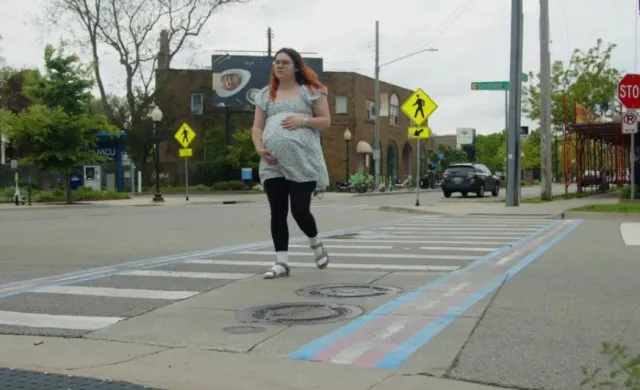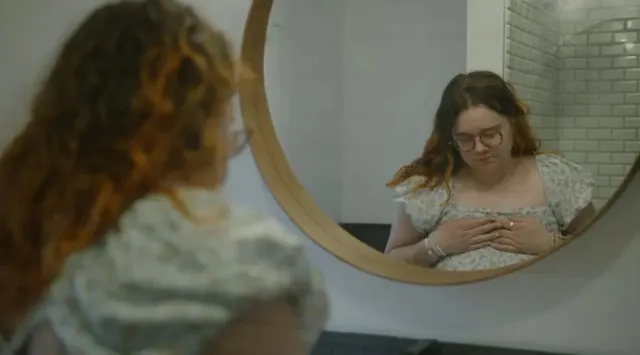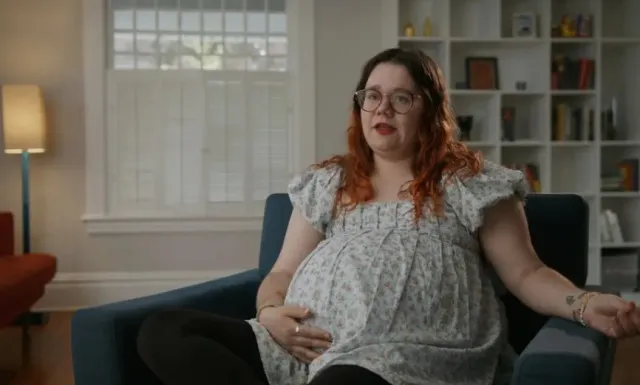Recently, a soon-to-be mom detransitioner who previously transitioned to male and then detransitioned has shared her deep regrets over changing her gender as a teenager. Her experience highlights the complex and often painful journey many individuals face when making life-altering decisions at a young age.
The detransitioner regrets gender change as a teen.
Prisha Mosley, who, at the age of 26, is preparing to welcome her baby boy into the world. However, her path to motherhood has been far from ordinary, as just a few years ago, she identified as a man.

Mosley’s decision to change genders led her to undergo various medical interventions, including testosterone treatments.
At the age of 18, she underwent a double mastectomy, leaving her with a scarred and disfigured chest.
These hormonal changes had far-reaching effects on her body, causing her natural reproductive functions to be disrupted. Despite assuming she was infertile due to the gender-affirming treatments she had undergone, Mosley was shocked to discover that she was pregnant.
“I still can’t believe I got pregnant,” she told me. “And I still can’t believe he’s healthy.”

Medical experts acknowledge that interventions such as cross-sex hormones can impact fertility, particularly when administered during a person’s developmental years.
Mosley reflects on these treatments’ profound impact on her body, disrupting its natural mechanisms.
The physical toll of her gender change and subsequent pregnancy has been immense.
Mosley’s body has suffered various complications, including an enlarged liver, high insulin levels, and atrophy of her uterus, bladder, and vagina.
Additionally, her hormone imbalance contributed to her baby’s large size, making vaginal delivery impossible due to her narrow hips.
Mosley highlights the absence of support and proper medical guidance for detransitioners like herself.

In her journey, she encountered doctors and therapists who were confident in their approach to treating gender dysphoria, advocating for the removal of her breasts and the administration of testosterone.
“They were so sure [in removing her breasts and pumping her with testosterone]. It was promise. I fully believed it because I needed to. I didn’t transition because I was having a good time. There was no neuroscience to change my brain, so I had to edit my body,” the detransitioner said.
However, the consequences of these decisions were never fully explained or understood.
Her gender confusion began at a young age, influenced by online gender ideologies.
Mosley was already dealing with severe anorexia, anxiety, and borderline personality disorder when she experienced a traumatic sexual assault at the age of 15, which resulted in a pregnancy and subsequent miscarriage.
While Mosley acknowledges the pain and personal challenges she has faced, she also expresses a deep concern for others who may find themselves in similar situations.

Through her advocacy as an Independent Women’s Forum Ambassador, she hopes to prevent others from experiencing the same emotional and physical turmoil she has endured.
“I could go on and on how tremendous that weight is,”
“But what’s worse is that it can happen to other people. The pain of imagining that someone else could feel or experience what I am experiencing makes the pain of being a public case study numb. It doesn’t compare. No one came and saved me when I was little. No one told me the truth,” she said.
After spending a few years in the transgender community, she realized in therapy that her gender wasn’t the main issue.
She decided to detransition and is now suing her doctors. She claims they misled her into getting medical procedures that have left her with lifelong problems.

One thing that bothers her the most is the removal of her breasts.
She now has painful lumps under her chest. Her doctor says these are milk masses trapped under scar tissue since her nipples were reattached for cosmetic purposes only.
Some breast tissue wasn’t fully removed, causing the production of milk in response to prolactin. Instead of having a soft chest for her baby, her chest feels hard and unnatural.
“It makes me feel like a monster. I put him on my chest and I don’t feel him.”

Mosley relies on donor breast milk, which has greatly helped her son.
“He spent his first days looking for things on my chest that aren’t there. All he did was throw up. The donor breast milk was the only thing that helped,” she said.
Mosley is also helping to raise her boyfriend’s daughter and would love to have more kids. “But I don’t think I can handle another pregnancy,” she said.